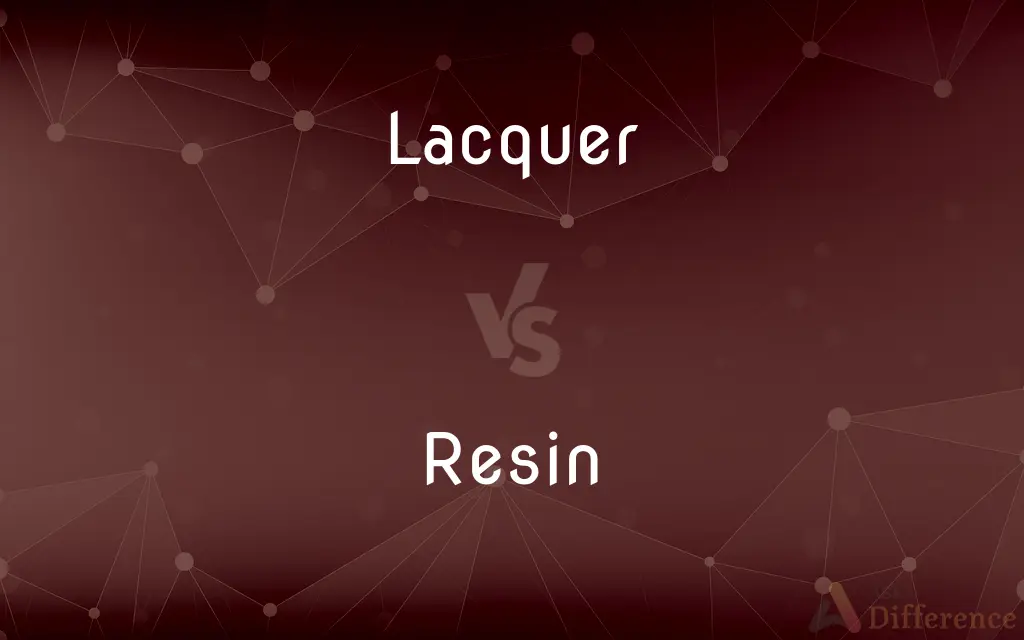Lacquer vs. Resin — What's the Difference?
Edited by Tayyaba Rehman — By Fiza Rafique — Updated on April 1, 2024
Lacquer is a clear or colored wood finish, quick-drying and solvent-based, while resin is a solid or highly viscous substance of plant or synthetic origin, often used in plastics and adhesives.

Difference Between Lacquer and Resin
Table of Contents
ADVERTISEMENT
Key Differences
Lacquer, traditionally derived from the sap of the lacquer tree, is known for its ability to provide a hard, highly glossy finish to wood and other materials. It dries by solvent evaporation and can be applied in several layers to create a durable protective coat. Whereas, resin, which can be either natural (like amber) or synthetic (such as epoxy), is celebrated for its versatility and strength. It's used not just as a finish but also as a key component in the production of a wide range of products, from jewelry to furniture and beyond.
Lacquer finishes are favored for their quick-drying properties, making them a popular choice for fast-paced production environments. They can be easily applied with a brush or a spray gun, allowing for a smooth, durable coat that resists chips and scratches. On the other hand, resins, especially epoxy resins, require a chemical reaction between two components to harden, a process known as curing, which can take anywhere from minutes to hours depending on the formula.
One of the key differences between lacquer and resin is their resistance to environmental factors. Lacquer, while offering a brilliant shine and protective coating, is susceptible to damage from UV light and chemicals, which can lead to discoloration and deterioration over time. Resin, particularly epoxy, is highly resistant to impacts, chemicals, and moisture, making it an ideal choice for outdoor furniture, floors, and as a protective layer over artwork.
The application process for lacquer and resin also differs significantly. Lacquer can be re-coated within a short period without the need for sanding between layers, facilitating a relatively quick application process. Resin, however, often requires precise mixing ratios, a clean working environment, and sometimes the removal of air bubbles after application to achieve a clear, flawless finish.
Despite these differences, both lacquer and resin have their unique aesthetic appeals. Lacquer's high-gloss finish can enhance the natural beauty of wood grains, making it a popular choice for fine furniture and musical instruments. Resin, with its clarity and thickness, can be used to encapsulate objects for decorative purposes or create a thick, glass-like coating that adds depth and protection.
ADVERTISEMENT
Comparison Chart
Base
Solvent-based, often derived from lacquer tree sap
Plant or synthetic origin, including epoxy and polyester
Application
Quick-drying, applied by brush or spray
Mixed components, cured over time
Durability
Susceptible to UV and chemicals, hard finish
Highly resistant to impacts, chemicals, moisture
Use
Wood finish, furniture, instruments
Adhesives, coatings, crafts, jewelry
Aesthetic
High gloss, enhances wood grain
Can be clear or colored, adds depth/thickness
Compare with Definitions
Lacquer
A quick-drying surface finish for various crafts.
She finished her handmade jewelry with a coat of lacquer for durability.
Resin
A medium for creative and decorative arts.
She used colored resin to create unique, vibrant artworks.
Lacquer
A solvent-based varnish with a glossy finish.
The lacquer on the guitar gave it a brilliant shine.
Resin
A synthetic or natural compound that hardens to form a solid.
The artist used resin to encapsulate flowers in her jewelry.
Lacquer
A sprayable finish used in automotive and furniture applications.
He used a spray gun to apply the lacquer evenly across the surface.
Resin
A component in fiberglass and composite materials.
Fiberglass boats are made using layers of glass cloth bonded with resin.
Lacquer
A protective film that enhances the appearance of wood.
The lacquer brought out the natural beauty of the wood grains.
Resin
A durable material used in coatings and sealants.
The tabletop was coated with a layer of epoxy resin for protection.
Lacquer
A fast-drying liquid that forms a hard, protective coating.
The carpenter applied a layer of lacquer to the table to protect it.
Resin
A viscous substance used in the creation of plastics and adhesives.
The resin was mixed thoroughly before being poured into the mold.
Lacquer
The term lacquer is used for a number of hard and potentially shiny finishes applied to materials such as wood or metal. These fall into a number of very different groups.
Resin
In polymer chemistry and materials science, resin is a solid or highly viscous substance of plant or synthetic origin that is typically convertible into polymers. Resins are usually mixtures of organic compounds.
Lacquer
Any of various clear or colored synthetic coatings made by dissolving nitrocellulose or other cellulose derivatives together with plasticizers and pigments in a mixture of volatile solvents and used to impart a high gloss to surfaces.
Resin
A sticky flammable organic substance, insoluble in water, exuded by some trees and other plants (notably fir and pine)
Clear resin had oozed to the surface, trickled down, and set
Lacquer
A glossy, resinous material, such as the processed sap of the lacquer tree, used as a surface coating.
Resin
A solid or liquid synthetic organic polymer used as the basis of plastics, adhesives, varnishes, or other products
Epoxy resins frequently cause dermatitis
The chassis is constructed of synthetic resin
Lacquer
A finish that is baked onto the inside of food and beverage cans.
Resin
Rub or treat with resin
Resined canvas
Lacquer
To coat with lacquer.
Resin
Any of numerous clear to translucent yellow or brown, solid or semisolid, viscous substances of plant origin, such as copal, rosin, and amber, used principally in lacquers, varnishes, inks, adhesives, plastics, and pharmaceuticals. Resins are usually insoluble in water.
Lacquer
To give a sleek, glossy finish to.
Resin
Any of numerous physically similar polymerized synthetics or chemically modified natural resins including thermoplastic materials such as polyvinyl, polystyrene, and polyethylene and thermosetting materials such as polyesters, epoxies, and silicones that are used with fillers, stabilizers, pigments, and other components to form plastics.
Lacquer
A glossy, resinous material used as a surface coating; either a natural exudation of certain trees, or a solution of nitrocellulose in alcohol, etc.
Resin
To treat or rub with resin.
Lacquer
A similar finish, baked onto the inside of cans.
Resin
A viscous hydrocarbon secretion of many plants, particularly coniferous trees.
Lacquer
To apply a lacquer to something or to give something a smooth, glossy finish.
Resin
Any of various yellowish viscous liquids or soft solids of plant origin; used in lacquers, varnishes and many other applications; chemically they are mostly hydrocarbons, often polycyclic.
Lacquer
A varnish, consisting of a solution of shellac in alcohol, often colored with gamboge, saffron, or the like; - used for varnishing metals, papier-maché, and wood. The name is also given to varnishes made of other ingredients, esp. the tough, solid varnish of the Japanese, with which ornamental objects are made.
Resin
Any synthetic compound of similar properties.
Lacquer
To cover with lacquer.
Resin
(transitive) To apply resin to.
Lacquer
A black resinous substance obtained from certain trees and used as a natural varnish
Resin
Any one of a class of yellowish brown solid inflammable substances, of vegetable origin, which are nonconductors of electricity, have a vitreous fracture, and are soluble in ether, alcohol, and essential oils, but not in water; specif., pine resin (see Rosin).
Lacquer
A hard glossy coating
Resin
Any of various polymeric substance resembling the natural resins[1], prepared synthetically; - they are used, especially in particulate form, in research and industry for their property of specifically absorbing or adsorbing substances of particular types; they are especially useful in separation processes such as chromatography; as, an ion-exchange resin.
Lacquer
Coat with lacquer;
A lacquered box from China
Resin
Any of a class of solid or semisolid viscous substances obtained either as exudations from certain plants or prepared by polymerization of simple molecules
Common Curiosities
Can resin be used outdoors?
Yes, especially epoxy resin, which is highly resistant to weather, UV light, and moisture.
What is lacquer made of?
Lacquer is made from the sap of the lacquer tree or synthetic polymers dissolved in a solvent.
How fast does lacquer dry?
Lacquer dries quickly, often within minutes to a few hours, depending on the formulation.
Is resin durable?
Yes, resin is known for its durability, resistance to impact, chemicals, and moisture.
Does resin yellow over time?
Some resins, like epoxy, may yellow with UV exposure, though UV-resistant formulas are available.
How long does resin last?
When properly applied and maintained, resin can last for decades without significant deterioration.
Is lacquer waterproof?
Lacquer provides water resistance, but prolonged exposure can damage the finish.
Can lacquer finishes be repaired?
Yes, lacquer finishes can be touched up or re-coated to repair minor damage.
Can lacquer be applied over paint?
Yes, but the surface must be clean and properly prepared to ensure adhesion.
Can you polish lacquer?
Yes, lacquer can be polished to a high gloss after it has fully cured.
Does lacquer smell?
Lacquer emits a strong smell during application and drying, necessitating good ventilation.
How do you apply resin?
Resin is mixed in precise ratios and poured or brushed onto the surface, often requiring curing time.
What are common uses for resin?
Resin is used in adhesives, coatings, crafting, jewelry making, and as a protective layer in various applications.
Is lacquer food safe?
Once fully cured, certain lacquers are considered food safe, though it's important to verify the specific product's safety.
What's the difference between resin and plastic?
Resin is a raw material used to make plastics, which are resin that has been polymerized.
Share Your Discovery

Previous Comparison
Expedition vs. Journey
Next Comparison
Histology vs. MorphologyAuthor Spotlight
Written by
Fiza RafiqueFiza Rafique is a skilled content writer at AskDifference.com, where she meticulously refines and enhances written pieces. Drawing from her vast editorial expertise, Fiza ensures clarity, accuracy, and precision in every article. Passionate about language, she continually seeks to elevate the quality of content for readers worldwide.
Edited by
Tayyaba RehmanTayyaba Rehman is a distinguished writer, currently serving as a primary contributor to askdifference.com. As a researcher in semantics and etymology, Tayyaba's passion for the complexity of languages and their distinctions has found a perfect home on the platform. Tayyaba delves into the intricacies of language, distinguishing between commonly confused words and phrases, thereby providing clarity for readers worldwide.















































